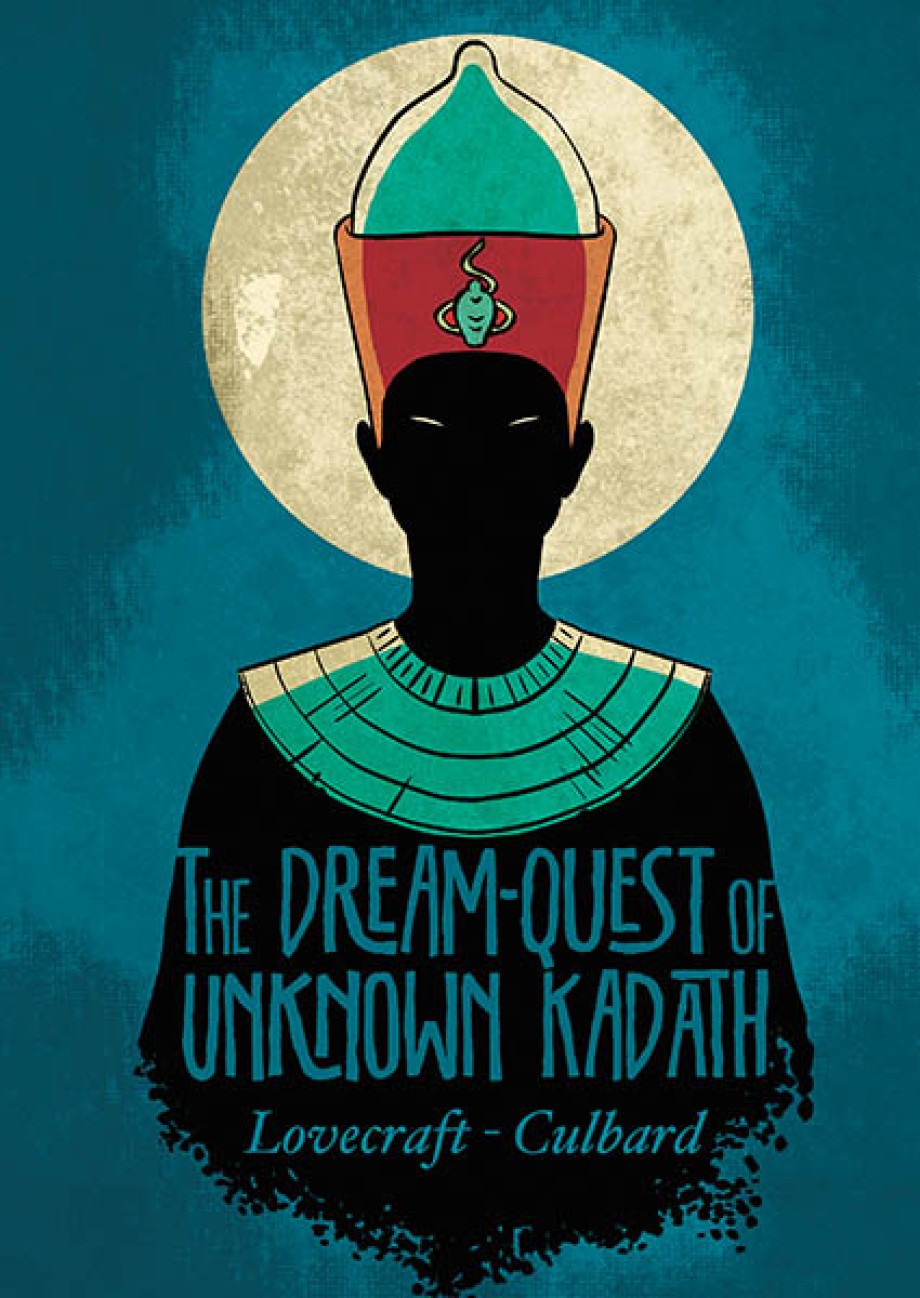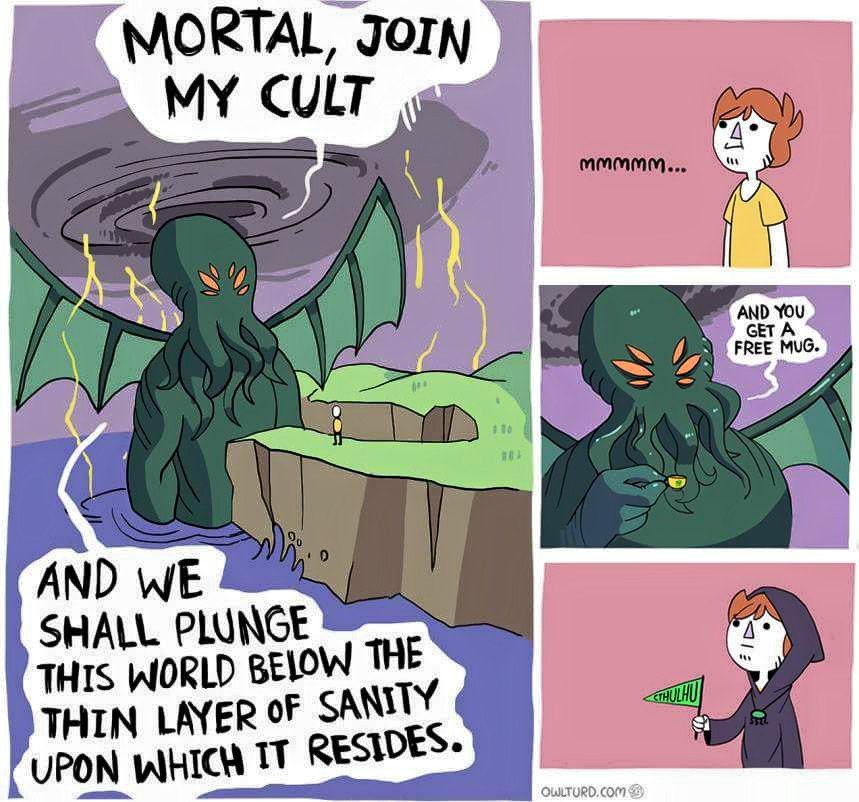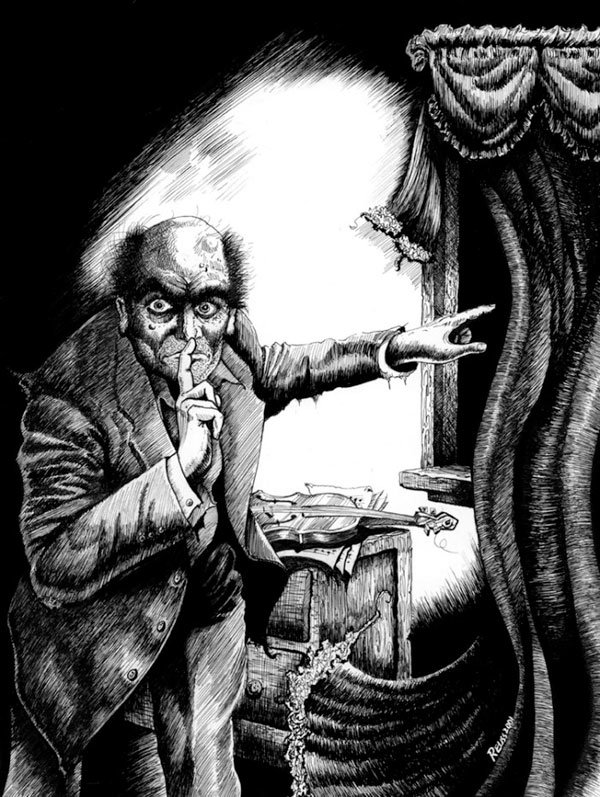 |
Showing posts with label Lovecraft. Show all posts
Showing posts with label Lovecraft. Show all posts
Thursday, October 25, 2018
Thirty-one Days of Lovecraft: Day 25
Thursday, October 11, 2018
Thirty-one Days of Lovecraft: Day 10
Wednesday, October 10, 2018
Thirty-one Days of Lovecraft: Day Nine
Thirty-One Days of Lovecraft: Day Eight
Monday, October 8, 2018
Thirty-one days of Lovecraft: Day Seven
Sunday, October 7, 2018
Thirty-One Days of Lovecraft: Day Six
Saturday, October 6, 2018
Thirty-one Days of Lovecraft: Day 5
Wednesday, October 3, 2018
Thirty-one days of Lovecraft: Day 3
Tuesday, October 2, 2018
Thirty-One Days of Lovecraft: Day 2
Thirty-one Days of Lovecraft: Day One
 I read over my page target for day one. Already a sign of madness? Perhaps... Let's see how things went on Day 1 of Thirty-One Days of Lovecraft.
I read over my page target for day one. Already a sign of madness? Perhaps... Let's see how things went on Day 1 of Thirty-One Days of Lovecraft.This isn't to say that there aren't some spine tingling passages in the opening 45 pages. The entity that speaks at the end of "Beyond the Wall of Sleep" says some chilling things. Things like, "How little does the earth-self know of life and its extent! How little, indeed, ought it to know for its own tranquility! Of the oppressor I cannot speak. You on Earth have unwittingly felt its distant presence-you who without knowing idly gave to the blinking beacon the name of Agol, the Daemon-Star."
In the opening few stories, I think Beyond the Wall of Sleep is by far the best, because it starts to really get into what Lovecraft is known for: cosmic horror. And the cosmos is horrific because it does not care about mankind. From the introduction, written by S.T. Joshi, "...Lovecraft, in a major departure from the previous horror tradition - and, in many ways, from the entire Western literary tradition which habitually if unconsciously stressed the centrality of human beings to the cosmos - would emphasize the insignificance of humanity in a universe that appears to be boundless both in space and time." To Lovecraft, man is so insignificant that we don't even know we're being oppressed by an ancient entity from beyond the stars. We can't comprehend what is going on.
The first story is "The Beast in the Cave" which is not bad considering it was written by a 15-year-old boy. But still, given what we know is coming in the anthology, the twist of the beast being a man and the narrator being rescued after a short time is a bit of a let down. But, as the stories progress, they get more and more nuanced and better. Take, for instance, "The Tomb" a story that has Poe's influence all over it. A boy obsessed with a burial tomb, who comments on his own unreliability as a narrator, who learns secrets from the past by communing with the dead, is a fun tale. It isn't scary, per se, if only because the narrator seems ok with what's going on.
Contrast this with "Dagon", which begins with the narrator saying he's going to commit suicide because he's been driven mad by what he saw. Or "Polaris" in which the North Star drives someone mad. These stories I can get behind because, well, if the narrator is distressed, then I'm distressed.
Madness count: Slow early on, but could make an argument for the narrator going mad in "The Tomb". "Dagon", "Polaris", and "Beyond the Wall of Sleep" all feature people going mad. A character in "Beyond the Wall of Sleep" goes so mad, on account of being possessed by a cosmic entity, but his body can't handle it and he dies. In "Dagon" the narrator commits suicide to stop feeling things.
Is that racist? Not too racist early on. "Polaris" does speak of "squat, hellish, yellow fiends..." but it's referring to a fictional race of aliens, so I don't know that I'd call it racist. Granted, it's not as if authors haven't hidden behind fictional races to say some pretty nasty things about people. (See also, Tolkein's Dwarves are maybe Jews?)
I did have to re-read the beginning of "Beyond the Wall of Sleep" a few times to make sure that I was correct in the ethnicity of Joe Slater, the person that will go insane and die from being possessed by a cosmic entity. He's an inbred person of Dutch Heritage living in the Catskill Mountains. However, Lovecraft writes some very unflattering descriptions of him throughout. Slater is, a "repellent scion of a primitive colonial peasant stock" and "pitiably inferior in mentality and language alike". Before he dies, the entity says of him, "He is better dead, for he was unfit to bear the active intellect of cosmic entity. His gross body could not undergo the needed adjustments between ethereal life and plant life. He was too much of an animal; too little of a man..." Again, this isn't racist for two reasons: 1) Lovecraft is writing about a white man and 2) I think we can give Joe Slater a pass because bearing the active intellect of a cosmic entity is probably very hard. Still, reading this and knowing of Lovecraft's racism still left me a bit uncomfortable during the story.
Up next: Memory, Old Bugs, The Transition of Juan Romeo, The White Ship, The Street, The Doom that Came to Sarnath, The Statement of Randolph Carter, The Terrible Old Man, The Tree, The Cats of Ulthar.
I'm reading more than 35 pages so that when I inevitable don't read for a day, I'm not way behind. See you tomorrow!
Monday, October 1, 2018
Thirty-one Days of Lovecraft: Pre-read
I decided that this October would be a good time to read some Lovecraft. A few years ago, I purchased "HP Lovecraft: The Complete Fiction" from Barnes and Noble. It has been taunting me ever since. I've always wanted to read it, but for whatever reason, I opted not to.
 Until now.
Until now.Before I begin reading, I thought I would write out what I know about Lovecraft and what to expect.
For someone who owns a Cthullu plush I have read only a few Lovecraft stories (and the call of the Cthullu is not one of them). As someone who enjoys science fiction, I feel embarrassed that I haven't read more. Time to rectify the situation.
So, what do I know about Lovecraft? I know that Lovecraft was an influential author of science fiction and cosmic horror. His writing helped to elevate the genre of science fiction. From what I think I know, a lot of his horror stems from man confronting an uncaring universe and uncaring cosmic entities.
I also know that Lovecraft was racist, extremely racist. This has been evident from the little reading that I've done, and from numerous scholars. Does that negate his writing? Does it taint his influence? I don't know.
One could argue that horror literature as a genre has a lot to owe to HP Lovecraft, though sometimes that homage has racist overtones. A novel that I really want to read, Lovecraft Country, uses racism as an evil as bad as anything Lovecraft concocted. I will probably read this in November.
Ultimately, the ability to separate Lovecraft's racism from the cosmic horror he writes will come down to an individual reader. Some can probably push it a way, some cannot. Neither of these is a "correct" reading of Lovecraft, or any author. It also would be unfair to make Lovecraft out to be the author with the most baggage. Hemingway, one of my favorite writers, is misogynistic.
Anytime you read an author from a different era, there will be a clash of values. This does not excuse Lovecraft's racism, nor is his racism just a product of our more modern times. It is worth examining though.
That is what I hope to do.
Each day, I will read 35 pages. By doing so, I will finish the book by the end of the month. I will try to write updates. I'll also put up what's coming next in case anyone wants to follow along or has read stories.
First up: Introduction, The Beast in the Cave, The Alchemist, The Tomb, Dagon, A Reminiscence of Dr. Samuel Johnson, Polaris, Beyond the Wall of Sleep.
Subscribe to:
Posts (Atom)



:format(jpeg):mode_rgb():quality(40)/discogs-images/R-3053075-1420984348-5659.jpeg.jpg)



